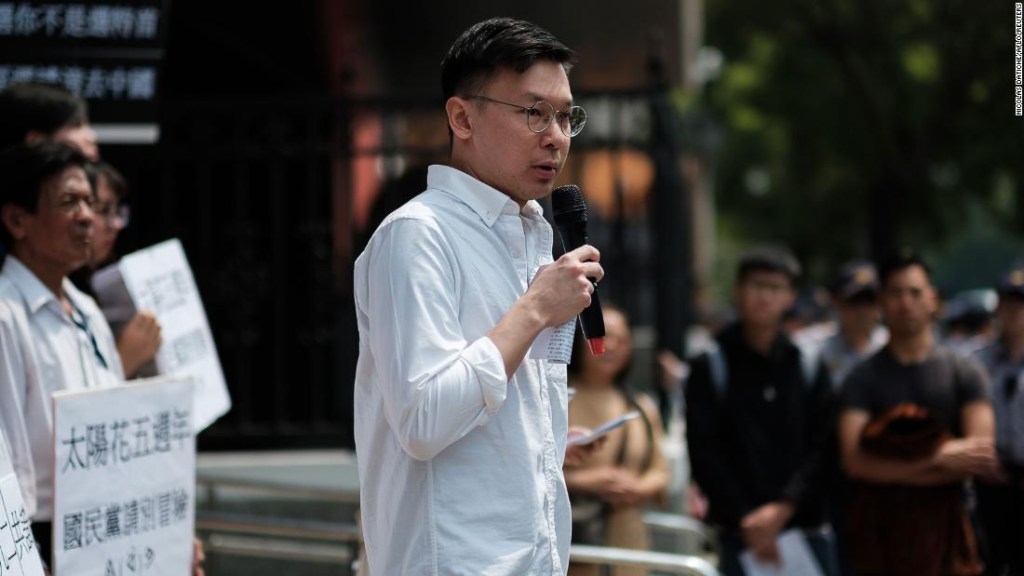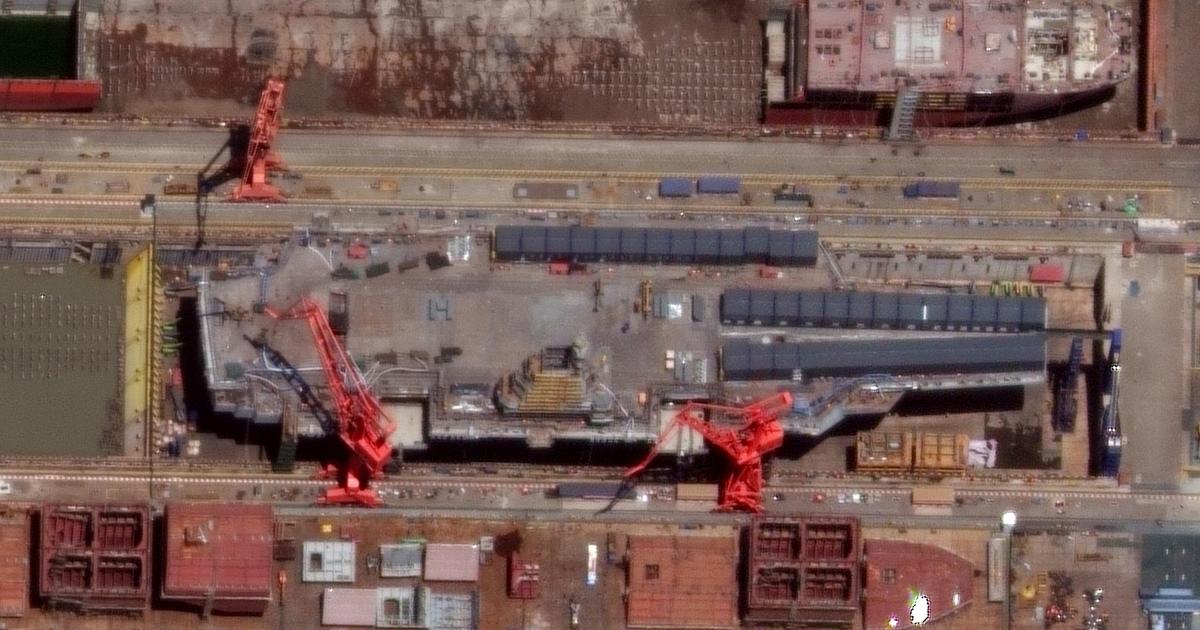A woman holds Taiwanese flags in front of the Presidential Palace before the National Day celebration begins in Taipei, Taiwan, on October 10, 2021.
(CNN) -
In just five years, Lin Fei-fan went from running against the Taiwanese legislature and occupying the building with hundreds of students to high-level work for the island's ruling party.
But his story could have been very different if he had lived in Hong Kong, where student activists once crippled the financial center when they took to the streets to demand democracy and freedoms.
Everything you need to know about the dispute between Taiwan and China
Lin says he was only able to observe from afar how nearly all pro-democracy figures in nearby Hong Kong, about 500 miles southwest of Taipei, were arrested or fled abroad since Beijing imposed a controversial national security law on response to the massive pro-democracy protests in the city.
"If I were in Hong Kong, I think I would probably be in jail," said Lin, the 33-year-old undersecretary general of Taiwan's ruling Democratic Progressive Party (DPP).
Recent events in Hong Kong have given Lin greater determination to defend Taiwan's sovereignty, he said, and he is not alone.
Sunflower Movement activist Lin Fei-fan delivers a speech in front of the Taiwanese Parliament on March 27, 2019 in Taipei, Taiwan.
Hong Kong authorities have arrested democracy supporters, including opposition politicians and newspaper editors, and a growing number of people in Taiwan have reflected on the island's future relationship with mainland China.
advertising
Since the Hong Kong protests broke out in 2019, more than 32% of respondents in Taiwan preferred to move toward formal "independence" - double the number in 2018 - according to a poll by National Taiwan Chengchi University in June.
Less than 8% of those polled were in favor of "unification" with mainland China, while the majority wanted to maintain the status quo, an agreement whereby Taiwan remains autonomous, but without an official declaration of independence.
Samuel Li, a student from Kaohsiung City in southern Taiwan, said that Beijing's crackdown on Hong Kong had increased his distrust of the communist regime.
"It reinforced my thoughts on the Chinese government because they don't actually do what they say. They always break their promises," he said.
"I really wish Taiwan remained as it is today."
Growing tensions
Mainland China and Taiwan have been separated since the end of the Chinese civil war more than 70 years ago, when defeated nationalists withdrew to the island.
Taiwan is now a flourishing multi-party democracy, but the ruling Communist Party of China continues to view the island as an inseparable part of its territory, even though it has never controlled it.
CNN Exclusive: Taiwan President Says China's Threat Increases "Every Day" and Confirms the Presence of US Military Trainers on the Island
Today, relations between Taipei and Beijing are at their lowest point in decades.
In October, China's military sent a record number of fighter jets into the air around Taiwan, while Chinese diplomats and state media warn of a possible invasion unless the island follows the Beijing line.
But this has not always been the case.
In fact, for much of the past 30 years, the possibility of conflict seemed remote.
In the early 1990s, many Taiwanese companies relocated their manufacturing operations to the mainland, where labor was cheaper and authorities were hungry for outside investment to fuel economic growth.
Ties prospered even more after the turn of the century.
Taiwanese pop music and television became wildly popular on the mainland, and Chinese tourists flocked to visit Taiwan, touted by state media as China's "treasure island."
A woman holds Taiwanese flags in front of the Presidential Palace before the National Day celebration begins in Taipei, Taiwan, on October 10, 2021.
In 2015, then-Taiwan President Ma Ying-jeou held a historic meeting with Chinese President Xi Jinping in Singapore, but only with the leaders of their respective political parties, the Nationalists and Communists.
They promised to reduce hostility, and Ma's party agreed that both Taiwan and mainland China belong to the same country and favored closer economic cooperation.
However, relations quickly deteriorated after 2016, when Tsai Ing-wen of the traditionally independent DPP won an overwhelming presidential election in Taiwan.
Tsai has repeatedly highlighted and defended Taiwan's sovereignty, calling on Beijing to respect the wishes of the Taiwanese people.
In an interview with CNN last month, Tsai said the threat from Beijing is increasing "every day."
"China's plan for the region is very different from the previous one," he said.
"It is more ambitious, more expansionary, and therefore things that are acceptable to them then may not be acceptable to them now."
In 2019, Beijing proposed a "One Country, Two Systems" formula for Taiwan, similar to the one used to rule Hong Kong since its handover from Britain to China in 1997.
Under the agreement, Hong Kong was guaranteed to maintain a high degree of autonomy from the mainland government after its return to Chinese rule.
But since then, Hong Kong's pro-democracy camp and human rights activists have sued in Beijing for betraying their promise and eroding democracy and civil liberties in the city, particularly in the wake of the 2019 protests and the imposition of the security law.
Taiwanese President Tsai Ing-wen greets Defense Minister Chiu Kuo-cheng during a ceremony at the Chiayi Air Force in southern Taiwan on November 18, 2021.
Speaking to CNN in October, Tsai said her citizens had rejected the model.
"The Taiwanese people have clearly said that they do not accept 'One Country, Two Systems' as the formula that can solve cross-strait problems," he said.
In January 2020, more than six months after the Hong Kong protests broke out, Tsai won re-election by a significant margin over his nationalist opponent Han Kuo-yu, who favored closer economic ties with Beijing.
Political observers have attributed his victory in part to his support for the Hong Kong protests.
Austin Wang, an assistant professor at the University of Nevada, Las Vegas, who specializes in Taiwanese politics, said Beijing's crackdown on Hong Kong has played a major role in the way Taiwan's younger generation views China.
"In the past, many Taiwanese agreed with 'One Country, Two Systems' because China promised that people's daily lives will remain the same. But the situation in Hong Kong suggests otherwise," he said.
"I think the problem is trust. When Taiwanese consider that China is not trustworthy, all promises or incentives made by China are discarded."
Economic interdependence
But despite mounting tensions in the Taiwan Strait in recent years, both Beijing and Taipei cannot afford to cut ties completely.
Last year, mainland China was Taiwan's largest trading partner, accounting for 26% of the island's total trade volume, according to the Taiwan Foreign Trade Office.
Meanwhile, mainland companies rely on Taiwan, particularly the Taiwan Semiconductor Manufacturing Company (TSMC), for its super-advanced semiconductor chips as China competes with the US in a technology race.
While the world's attention has often focused on Beijing's growing military threat to Taipei, Wang said that many Taiwanese also recognized that the island's economy depends on its relationship with the mainland.
The list of personalities "disappeared" after coming into conflict with the government of China
"The Taiwanese people realize the importance of cross-strait economic cooperation, and Taiwan's economy is highly dependent on China," he said.
"However, the Taiwanese are also cautious about how much China can exploit this dependence for political gain."
In 2013, then-Taiwan President Ma proposed the Cross-Strait Trade in Services Agreement, which would have opened up key Taiwan industries, including banking, healthcare and communications, to mainland Chinese investment.
The trade pact raised concerns that closer economic integration with Beijing could damage Taipei's autonomy.
"Regional economic integration is an unstoppable global trend. If we don't face this and join the process, it will only be a matter of time before we are eliminated from the competition," Ma said.
Lin, then a graduate student at National Taiwan University, subsequently led the 2014 Sunflower Movement, which successfully forced the Ma government to scrap the trade deal.
The three-week-long protest saw student activists occupy Taiwan's legislative building in the largest demonstrations on the island in decades.
Today, Lin regularly advises President Tsai on key policies.
He said Taiwan should reduce its economic dependence on China by building more partnerships with the United States, Japan and the rest of the world.
"We must be aware that China is a country that often uses economic means to interfere in the politics of other nations," he said.
"We will continue to interact economically with China in the future, but we must also keep our distance to minimize the impact of a supply chain restructuring or China's internal instability in Taiwan."
China could use military force to control Taiwan 1:57
CNN's Will Ripley and Gladys Tsai contributed reporting from Taipei.
Taiwan




/cloudfront-eu-central-1.images.arcpublishing.com/prisa/3I74UEXLYRBBRPGPSGWNN6WXH4.jpg)


